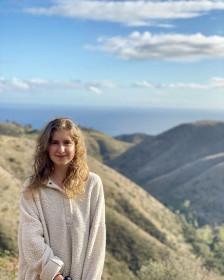Second-year Industrial/Organizational psychology graduate student Kelsi Cornett is working incredibly hard to help improve how society manages diversity, equity, and inclusion (DEI) efforts within the workplace. Growing up in a small town in Tennessee, Cornett was exposed to a lot of inequality, prejudices, and a lack of representation and inclusion of diverse groups. Eager for a change, Cornett moved to Chicago to study Industrial/Organizational psychology at DePaul University. It was at that point that she became interested in researching how workplaces can facilitate diverse and inclusive environments. “The idea of not only accepting diversity but celebrating it and seeing it as an asset excited me,” Cornett said.
It should come as no surprise then that Cornett’s research interests are in the detection of discrimination and promotion of diversity and inclusion best practices in the workplace.
One of two projects Cornett is working on, “Using Computers to Humanize Us: Applying Natural Language Processing to Improve the Detection of Offensive Workplace Statements,” uses natural language processing (NLP) to detect subtle offensive statements or microaggressions using a transformer (RoBERTa) model that utilizes word importance to classify the offense and predict to whom and why the statement is offensive. Cornett won an award and grant from the Institute for Critical Technology and Applied Science (ICTAS) which funds her research in microaggressions and allows her to partner with HBCUs.
Talking about this ICTAS grant, Cornett said, “Through the ICTAS Diversity and Inclusion grant, I am able to sample lived experiences from broader populations that are traditionally underrepresented in Psychology. My research also uses machine learning approaches to capture subtle themes within workplace offenses that may otherwise go unnoticed, and to analyze data in a scalable way across thousands of individuals, which allows for including a more diverse and encompassing population within a study.”
Cornett hopes her research may have a positive impact on society in the future. “I hope my research into microaggressions and subtle workplace offensive statements facilitates more aware and sensitive workplace cultures,” said Cornett.
When asked about how her research interests align with her work, Cornett said, “I want to not only understand and uncover the environments which facilitate mistreatment and discrimination, but what environments do not. Both of my projects allow me to better understand the problems so I can try to find the solution.”
Kelsi’s advisor, assistant professor Dr. Ivan Hernandez, said of Cornett’s work, “I think Kelsi's research examines questions about experiences in the workplace for people who don't often get a voice--marginalized and underrepresented group members. Because of their status within society and organizations, it is often hard for their issues to be noticed. However, how can a problem be fixed if no one knows the problem exists or the magnitude of it? Her research benefits society by identifying not only the existence of these issues facing marginalized members, but also the effects they can have on others in terms of their career and subjective well-being.”
Hernandez went on to say, “She uses a combination of big data and machine learning methods to identify the extent that various workplace affronts and disparities occur, by finding patterns and themes in massive datasets, where these disparities would otherwise be obscured to traditional research methods. Therefore, her work is needed because it gives a second look to problems, using methods better suited for identifying them.”
After graduation, Cornett hopes to drive real change by working in-house as a DEI-focused industrial organizational psychologist. She envisions herself researching and curating initiatives that will cultivate inclusive workplace cultures and policies.
